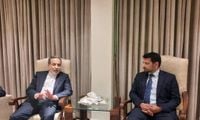Iran’s Foreign Minister Abbas Araghchi arrived in Pakistan on May 5, 2025, aiming to mediate escalating tensions between Islamabad and New Delhi following a deadly attack on tourists in the Indian-controlled region of Kashmir. This visit marks the first by a foreign dignitary since the tensions flared after the tragic April 22 incident that resulted in the deaths of 26 tourists, primarily Hindus, in Pahalgam, a popular resort town in Indian-administered Kashmir.
According to Pakistan’s Foreign Ministry, Tehran has offered to assist in easing the strain between the two nuclear-armed neighbors. Araghchi’s diplomatic mission comes at a critical time, as Pakistan’s armed forces have been on high alert since last week, following warnings from Cabinet Minister Attaullah Tarar, who cited credible intelligence suggesting that India might retaliate with military action.
Upon his arrival, Araghchi was greeted by senior Pakistani officials and is scheduled to meet with key figures, including Pakistan’s Foreign Minister Ishaq Dar, President Asif Ali Zardari, and Prime Minister Shehbaz Sharif. The Pakistani government has reiterated its denial of any involvement in the attack and has proposed a credible international investigation into the incident, although India has yet to accept this offer.
The recent escalation in hostilities has seen both countries expelling each other’s diplomats and nationals, alongside the closure of airspace. The situation has led to heightened military readiness on both sides, with Pakistan accusing the Indian Air Force of attempting to breach its airspace on April 28, prompting Pakistan to scramble its jets to intercept the Indian aircraft.
In a statement, Foreign Minister Ishaq Dar expressed Pakistan’s commitment to avoiding escalatory actions, stating, “We will not be the first to take any escalatory step.” However, he warned that any act of aggression from India would be met with a resolute defense of Pakistan’s sovereignty and territorial integrity. Dar has been actively engaging with international leaders, having spoken with over a dozen foreign dignitaries, including U.S. Secretary of State Marco Rubio and Russian Foreign Minister Sergey Lavrov.
As tensions mount, the humanitarian impact is also becoming evident. In Akhnoor, a town in Indian-controlled Kashmir, residents reported alarmingly low water levels in the Chenab River, which flows into Pakistan. One local farmer, Bal Krishan, remarked, “I have never seen this river dry in my life,” highlighting the growing concerns over resource management amid political strife.
Furthermore, Pakistan’s Information Minister Attaullah Tarar led journalists to the village of Bella Noor Shah, where he dismissed Indian claims of a militant training camp in the area as false. Residents corroborated Tarar’s assertions, stating they had never witnessed any such camp, further escalating the war of words between the two countries.
On the military front, Pakistan conducted a test launch of a short-range missile on May 5, marking the second missile test in a matter of days. The Fatah surface-to-surface missile, which has a range of 120 kilometers (75 miles), was launched from an undisclosed location. These military demonstrations are seen as part of Pakistan’s strategy to showcase its defense capabilities during a period of heightened tensions.
Meanwhile, the Indian government has continued to condemn the attack in Pahalgam, with Indian Foreign Ministry spokesperson Randhir Jaiswal announcing that Russian President Vladimir Putin had spoken with Indian Prime Minister Narendra Modi, strongly condemning the terrorist act. This international dimension adds another layer of complexity to the already fraught situation.
The historical context of the Kashmir conflict is essential to understanding the current crisis. The region has been a flashpoint between India and Pakistan since their independence in 1947, with both nations claiming the territory in full but controlling only parts of it. The two countries have fought three wars over Kashmir, and their relationship has been characterized by a cycle of conflict, aggressive diplomacy, and deep-seated mutual suspicion.
As the situation develops, the international community is closely monitoring the situation, with calls for restraint coming from various global leaders. The urgency for a diplomatic resolution is palpable, especially considering the nuclear capabilities of both nations. The ongoing conflict not only poses a threat to regional stability but also has significant implications for global peace.
In summary, Abbas Araghchi’s visit to Pakistan represents a crucial diplomatic effort to de-escalate tensions following a tragic attack that has rekindled historical grievances. The stakes are high as both nations navigate this precarious landscape, with the potential for military conflict looming large. As calls for restraint continue, the hope remains that dialogue and diplomacy can pave the way for a peaceful resolution to one of the world’s most enduring conflicts.




